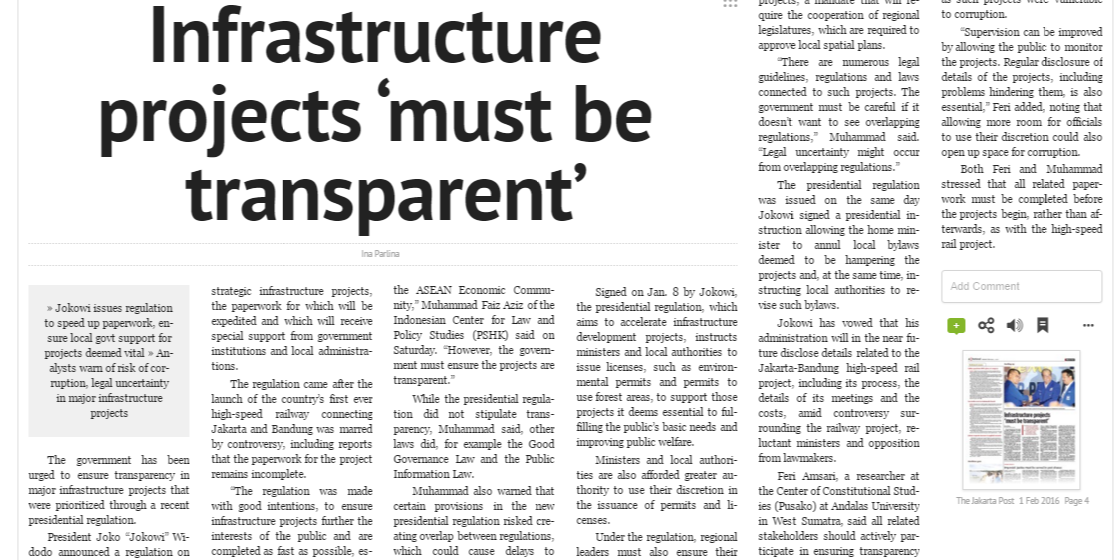Jokowi issues regulation to speed up paperwork, ensure local govt support for projects deemed vital » Analysts warn of risk of corruption, legal uncertainty in major infrastructure projects.
The government has been urged to ensure transparency in major infrastructure projects that were prioritized through a recent presidential regulation. President Joko “Jokowi” Widodo announced a regulation on Friday listing more than 200 strategic infrastructure projects, the paperwork for which will be expedited and which will receive special support from government institutions and local administrations.
The regulation came after the launch of the country’s first ever high-speed railway connecting Jakarta and Bandung was marred by controversy, including reports that the paperwork for the project remains incomplete.
“The regulation was made with good intentions, to ensure infrastructure projects further the interests of the public and are completed as fast as possible, especially since we are also facing the ASEAN Economic Community,” Muhammad Faiz Aziz of the Indonesian Center for Law and Policy Studies (PSHK) said on Saturday. “However, the government must ensure the projects are transparent.”
While the presidential regulation did not stipulate transparency, Muhammad said, other laws did, for example the Good Governance Law and the Public Information Law.
Muhammad also warned that certain provisions in the new presidential regulation risked creating overlap between regulations, which could cause delays to projects.
Signed on Jan. 8 by Jokowi, the presidential regulation, which aims to accelerate infrastructure development projects, instructs ministers and local authorities to issue licenses, such as environmental permits and permits to use forest areas, to support those projects it deems essential to fulfilling the public’s basic needs and improving public welfare.
Ministers and local authorities are also afforded greater authority to use their discretion in the issuance of permits and licenses.
Under the regulation, regional leaders must also ensure their spatial plans are in line with the projects, a mandate that will require the cooperation of regional legislatures, which are required to approve local spatial plans.
“There are numerous legal guidelines, regulations and laws connected to such projects. The government must be careful if it doesn’t want to see overlapping regulations,” Muhammad said. “Legal uncertainty might occur from overlapping regulations.”
The presidential regulation was issued on the same day Jokowi signed a presidential instruction allowing the home minister to annul local bylaws deemed to be hampering the projects and, at the same time, instructing local authorities to revise such bylaws.
Jokowi has vowed that his administration will in the near future disclose details related to the Jakarta-Bandung high-speed rail project, including its process, the details of its meetings and the costs, amid controversy surrounding the railway project, reluctant ministers and opposition from lawmakers.
Feri Amsari, a researcher at the Center of Constitutional Studies (Pusako) at Andalas University in West Sumatra, said all related stakeholders should actively participate in ensuring transparency in major infrastructure projects, as such projects were vulnerable to corruption.
“Supervision can be improved by allowing the public to monitor the projects. Regular disclosure of details of the projects, including problems hindering them, is also essential,” Feri added, noting that allowing more room for officials to use their discretion could also open up space for corruption.
Both Feri and Muhammad stressed that all related paperwork must be completed before the projects begin, rather than afterwards, as with the high-speed rail project.
============================================================================
Sumber : http://www.thejakartapost.com/paper
Terbit pada : Monday 01 February 2016
Tautan online: http://www.pressreader.com/indonesia/the-jakarta-post/

